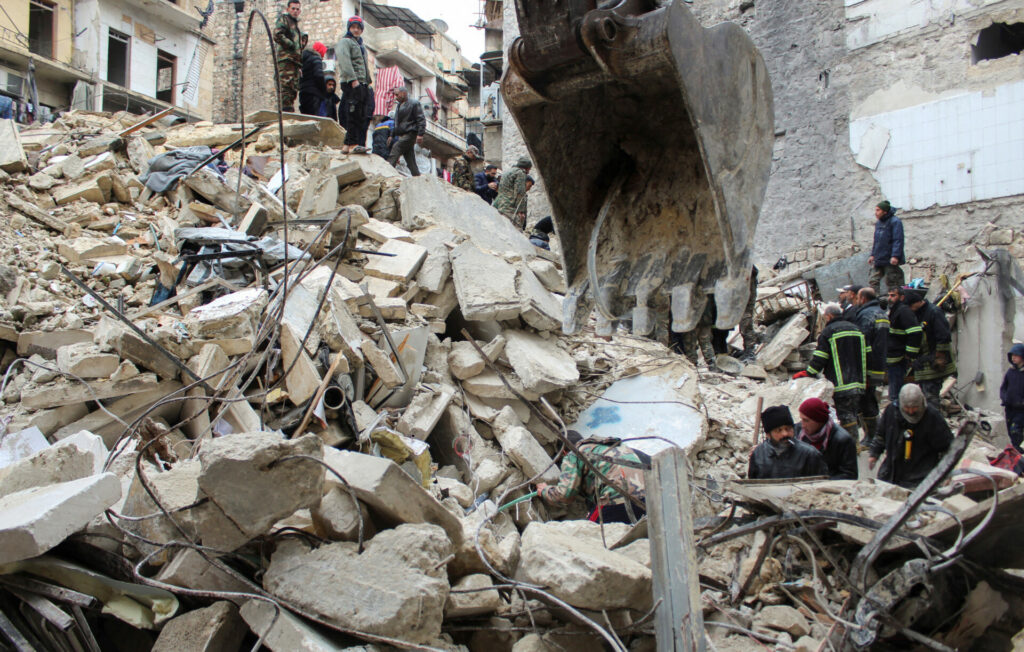In the wake of the massive earthquakes that hit Turkey and Syria on Monday, international humanitarian aid has been flooding into Turkey. But those who have been affected in Aleppo, Syria, remain deprived of help.
On Monday at 04:17 local time (02:17 Belgian time), a massive 7.8 earthquake hit Turkey and Syria. Less than 12 hours later, a second one of 7.5 hit southeast Turkey. The death toll already exceeds 11,600 with experts fearing this will rise considerably. Thousands are still missing as rescue teams tirelessly scramble through debris looking for signs of life.
While international humanitarian aid has rushed to the affected areas, Turkey has been the main recipient. Not for lack of trying, the only road that could transport aid into Syria from Turkey was damaged by the quake; the Russia-backed Syrian government is in no hurry to repair the vital infrastructure, reported Te Tijd.
"One of the main roads that the trucks and trailers use to bring aid to northwest Syria had been damaged by the earthquake, making it difficult to bring in major supplies," said the UN agency for refugees (UNHCR) in a statement to Middle East Eye.
Moreover, the border between Syria and Turkey is obstructed by a 764 km wall, with just one opening allowing aid to pass through to Syria. This narrow crossing was also affected by the devastating earthquake.
Belgium and Germany on Wednesday called for the border to be opened up and Development Minister Caroline Gennez (Vooruit) is releasing €4 million for the international fund to keep the border crossing open.
Yet any other crossing looks unlikely as the area has become a political tug-of-war in recent years. Syrian President Bashar al-Assad would rather not see international aid reaching the region, with the nearby city of Idlib the only remaining rebel enclave.
A president against his own people
"If anyone wants to help Syria, it can be done through the government," Assad stated, dismissing calls to reopen the other border crossings previously closed by Russia. Yet given Assad's oppression of the rebel-held region, it is widely accepted that he has no intention of allowing much-needed relief to reach the affected area.
In the 11 years that civil war has raged in Syria, President Assad has waged a brutal campaign, causing millions of civilians to flee to the border with Turkey. The displaced population is dependent on foreign aid and surrounded by Syrian government forces. Conditions on the ground are critical, with barely any food, children freezing and disease rampant. Government forces have regularly bombed medical facilities and aid posts in an effort to break any resistance.
Restoring the severely damaged pathway into Syria will not be possible in the short term, effectively cutting the region off from aid from Turkey – itself reeling from the shock and has mobilised all its resources to find people buried under heaps of debris and attend to survivors.
Already crippled by years of government bombardment, Aleppo is left to struggle alone. Jens Laerke, spokesperson for the UN humanitarian aid agency (OCHA), begged for the situation not to be politicised: "There are about seven days left in which rescue teams can find survivors. After that, things get difficult."
Heartwarming solidarity
Bernard Keutgens, a family therapist from Eupen who is affiliated with the Christian think tank Logia, has been working on the ground in Aleppo for five years. He told Gazet Van Antwerpen of the "heartwarming solidarity" and strength of the local population.
He explained how precious resources were shared among those too afraid to return to their homes. Further aid was provided in churches and mosques.
Although the centre of Aleppo was not too badly damaged, Keutgens explains that the surrounding suburbs have been devastated: "After four years of war and six years of neglect, no building here is undamaged."

